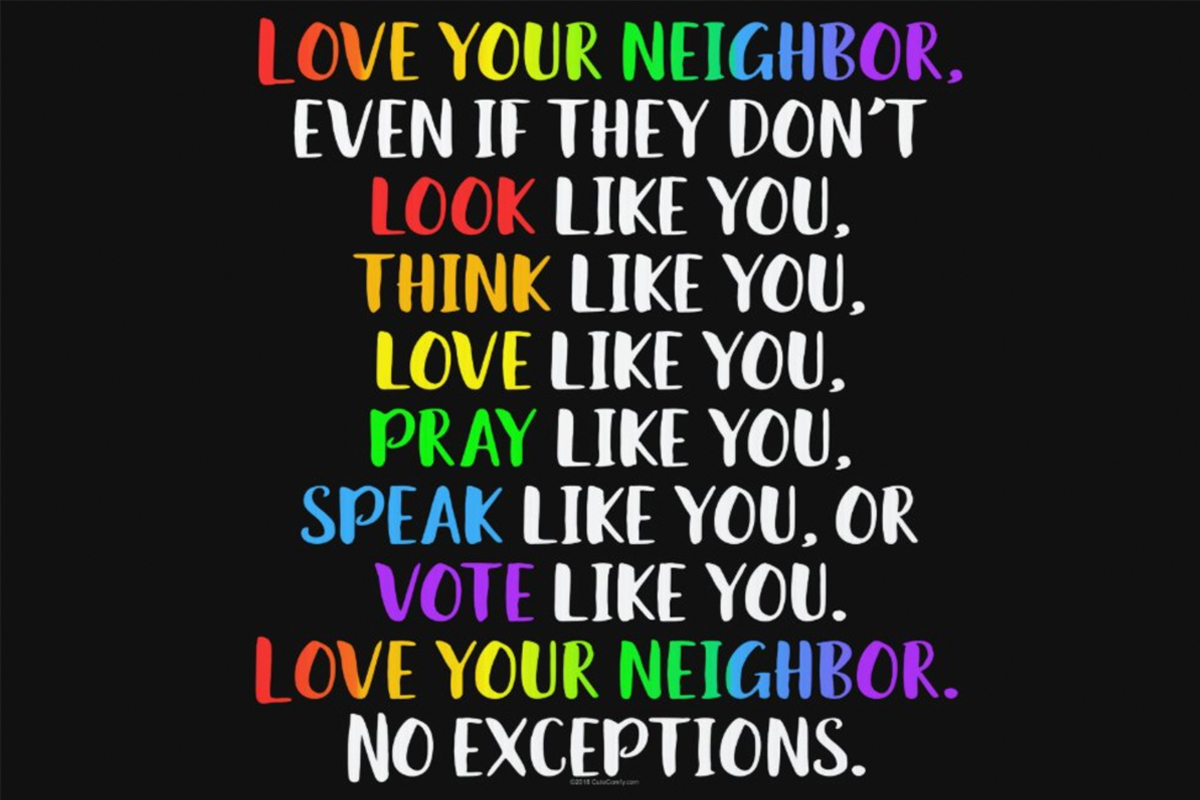Responsibility and Hard Work Needed to ‘Love Thy Neighbor’

This blog was adapted from a keynote address given at the annual dinner of the Connecticut Council for Interreligious Understanding on Oct. 10, 2023.
The words “love thy neighbor” are well worn, and some might even say cliché. The idea of “neighbors” and the meaning of the word “love”, it seems to me, both seem straightforward. And, yet their exact meaning can be very complicated.
My premise tonight is that although the ideas of “love” and “neighbor” seem self-evident, they are also more complex than we often realize. I also will suggest that that we—and I include myself in this—are not always as good as we may think we are in loving rightly and without exception, even those of us who believe in our bumper stickers and yard signs, indeed serve in the important work of interreligious organizations. In short, my message tonight is that “love thy neighbor” is hard work, and at times complicated, but is fundamentally important.
Many of the great religious traditions of the world hold to the idea of “Love thy neighbor”—Baha’i, Buddhism, Christianity, Hinduism, Islam, Jainism, Judaism, Sikhism, and Unitarian Universalism. But loving one’s neighbor is not actually all “warm and fuzzies.” Loving thy neighbor goes deep and involves many responsibilities. According to Leviticus 19 in the Bible, from where the words “love thy neighbor” are often quoted, it includes being truthful, honest, and impartial. It includes not setting up things to impede the underprivileged. It includes apportioning some of your harvest for the poor and the resident foreigner. It reaches, I think, into the totality of the great teachings of our faiths, those that show us how to live, how to more fully love thy neighbor. Don’t get me wrong, I do believe, with all that I am, that love of neighbor can involve emotion, or feeling, affection, and acceptance. But it goes much deeper. If we are honest with ourselves—despite our bumper stickers and yard signs—it is actually quite hard to love thy neighbor without exceptions.
I have been involved in interreligious work, interfaith education, and religious understanding for many years now. In truth, I feel like I’ve been working at it for most of my life given some of the tensions in my family around religion and, to some degree, race. If I am honest, I think interreligious work often operates in a vacuum. This is not intentional, but I need to be candid about what I have observed. It seems to me that interreligious work tends to be done among those who share political and ideological positions, often those that are left-leaning. That is, of course, somewhat understandable, and I share many of these perspectives myself. But coming from a more right-leaning family, at least on many issues, I have to say that I’m not sure these family members would feel welcome or understand what we are doing in our work. To put this another way:
Are we making enough space for conservatives in our work? Are we working hard enough to love those who truly think, pray, and vote differently than we do?
I don’t know the answer or solution to this, and my goal tonight is not to point fingers or make us feel guilty. It’s actually the last thing I feel like doing tonight, especially knowing so many of you in this room and your incredible commitments to work for peace and justice. But I offer this as my heartfelt challenge to us all, myself included, to really make a difference in whom we love and how we love them. If our work is to be meaningful, and make a real difference, those who support AOC and “the Squad” need to find some way to express love toward those who think “the election was stolen” and support Donald Trump. Those who believe we all worship the same God need to find ways to love those who think there is only one religion that worships the true God: their God. Those who believe that “love is love,” and gender is fluid, need to find ways to love those who have very different views of marriage, human sexuality, and gender. Don’t get me wrong, these things are true in reverse. Both sides need to love each other. But I use these examples, and I count myself among those in this audience tonight who would benefit from, at the very least, wrestling with this message.
“Love thy neighbor” is indeed simple, right, and clear. The idea of “neighbor” should have no exceptions, and “love” can be full of wonderful emotions and personal fulfillment. But love of neighbor can also be difficult, and at times complicated, forcing us to examine our own prejudices. It also involves more than feelings as it often requires a lot of action and responsibility.
I confess that I struggled with my words for tonight. Deeply so, in fact. I had the talk all mapped out in my mind, and the structure outlined, but then this weekend happened. The horrific news from Israel – Palestine hit me hard, as I’m sure it did you. What can I possibly say tonight that might make any sense, any sense at all, with all that is looming over our heads?
I am worried. I am saddened. I am broken and disturbed by what we are witnessing. The loss of life makes me tremble. I hope, I pray, for a quick end to this war and that somehow, by God’s grace, a resolution — a true, long-lasting, peaceful resolution — might be reached. I also hope that we might learn to love each other no matter what side of this difficult issue people might find themselves on Oh, Holy One, help us. We need your help.
